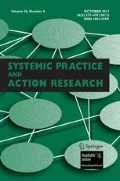Abstract
The process of knowledge acquisition which has the strongest truth claim is the research process of natural science, based on testing hypotheses to destruction. But the application of this process to phenomena beyond those for which it was developed, namely, the natural regularities of the physical universe, is problematical. For research into social phenomena there is increasing interest in “action research” in various forms. In this process the researcher enters a real-world situation and aims both to improve it and to acquire knowledge. This paper reviews the nature and validity of action research, arguing that its claim to validity requires a recoverable research process based upon a prior declaration of the epistemology in terms of which findings which count as knowledge will be expressed.
Similar content being viewed by others
REFERENCES
Argyris, C., Putnam, R., and MacLain-Smith, D. (1982). Action Science: Concepts, Methods and Skills for Research and Intervention, Jossey-Bass, San Francisco.
Blum, F. H. (1955). Action research—A scientific approach? Philos. Sci. 22(1), 1–7.
Campbell, D. T. (1988). In Overmann, E. S. (ed.), Methodology and Epistemology for Social Science: Selected Papers, University of Chicago Press, Chicago.
Checkland, P. (1981). Systems Thinking, Systems Practice, John Wiley, Chichester.
Checkland, P. (1985). From optimizing to learning: A development of systems thinking for the 1990s. J. Operat. Res. Soc. 36(9), 757–767.
Checkland, P. (1991). From framework through experience to learning: The essential nature of action research. In Nissen, H.-E., Klein, H. K., and Hirschheim, R. (eds.), Information Systems Research, Elsevier, Amsterdam.
Checkland, P. (1997). Rhetoric and reality in contracting: Research in and on the NHS. In Flynn, R., and Williams, G. (eds.), Contracting for Health, Oxford University Press, London.
Checkland, P., and Holwell, S. (1997). Information, Systems and Information Systems, John Wiley, Chichester.
Checkland, P., and Scholes, J. (1990). Soft Systems Methodology in Action, J. Wiley, Chichester.
Clark, P. A. (1972). Action Research and Organizational Change, Harper and Row, London.
Dash, D. P. (1997). Problems of Action Research, Working Paper No. 14, University of Lincolnshire and Humberside.
Eden, C., and Huxham, C. (1996). Action research for the study of organizations. In Clegg, S., Hardy, C., and Nord, W. (eds.), The Handbook of Organization Studies, Sage, Beverly Hills, CA.
Engels, P. G. H., and Salomon, M. L. (1997). Facilitating Innovation for Development, Royal Tropical Institute, The Netherlands.
Foster, M. (1972). An introduction to the theory and practice of action research in work organizations. Hum. Relat. 25(6), 529–556.
Hult, M., and Lennung, S. (1980). Towards a definition of action research: a note and bibliography. J. Manage. Stud. 17(2), 242–250.
Keynes, J. M. (1938). Discussion of R. F. Harrod's presidential address to the Royal Economic Society. In Moggridge, D. E. (ed.) (1976), Keynes, Fontana/Collins, London.
Lewin, K. (1947). Frontiers in group dynamics 11: Channels of group life; Social planning and action research. Hum. Relat. 1, 143–153.
Moggridge, D. E. (1976). Keynes, Fontana/Collins, London.
Phillips, D. C. (1992). The Social Scientist's Bestiary: A Guide to Fabled Threats to, and Defences of, Naturalistic Social Science, Pergamon Press, Oxford.
Revans, R. (1972). Hospitals: Communication, Choice and Change, Tavistock, London.
Susman, G. (1983). Action research. In Morgan, G. (ed.), Beyond Method, Sage, Beverly Hills, CA, pp. 95–113.
Susman, G., and Evered, R. D. (1978). An assessment of the scientific merits of action research. Admin. Sci. Q. 23, 582–603.
Torbet, W. R. (1991). The Power of Balance: Transforming Self, Society and Scientific Inquiry, Sage, Newbury Park, CA.
Toulmin, S., Rieke, R., and Janik, A. (1979). An Introduction to Reasoning, Macmillan, New York.
Whyte, W. F. (ed.) (1991). Participatory Action Research, Sage, Newbury Park, CA.
Ziman, J. J. (1968). Public Knowledge, an Essay Concerning the Social Dimension of Science, Cambridge University Press, London.
Author information
Authors and Affiliations
Rights and permissions
About this article
Cite this article
Checkland, P., Holwell, S. Action Research: Its Nature and Validity. Systemic Practice and Action Research 11, 9–21 (1998). https://doi.org/10.1023/A:1022908820784
Issue Date:
DOI: https://doi.org/10.1023/A:1022908820784



